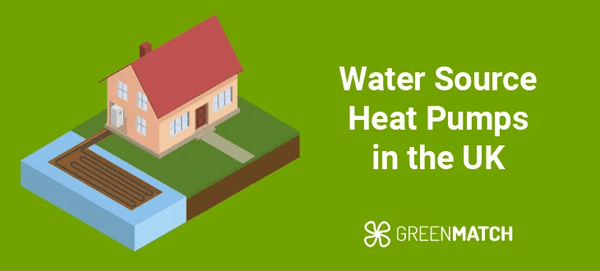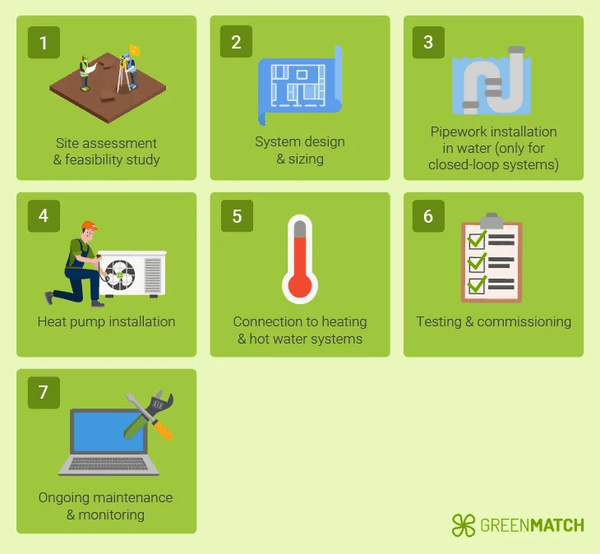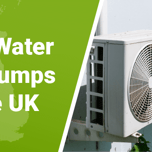Answer these simple questions and we will find you the BEST prices
Which type of solar quotes do you need?
It only takes 30 seconds
100% free with no obligation

Get up to 4 quotes by filling in only 1 quick form

Install a heat pump for less with the BUS grant

We’ve helped over 500,000 homeowners reduce their carbon footprint
- GreenMatch
- Water Source Heat Pumps
Water Source Heat Pumps in the UK: Costs, Installation & Benefits


- A water source heat pump extracts heat from a nearby water source to provide energy-efficient temperature control.
- The cost of a water source heat pump typically ranges from £5,000 to £18,000, depending on the system size and installation complexity.
- The biggest benefit of a water source heat pump is its high efficiency. They can achieve efficiencies of 300% to 600%, meaning that every 1kW of energy used will get you 3kW to 6kW of heat energy.
Water source heat pumps are a solid way to control your home's temperature year-round. They can hit 300% to 600% efficiency, so for every 1kW of electricity, you get 3kW to 6kW of heat. That means less energy wasted, lower bills, and a smaller carbon footprint compared to traditional heating systems.
A good system can knock up to £1,200 off yearly heating costs, depending on what it replaces. Yet, is it the best choice for the specific needs of your home?
This guide covers how water source heat pumps work, what they cost, what makes them worth it, and what to consider before getting one. By the end of reading, it should be easier to decide if a water source heat pump is a good move for you.
Already eager to invest in a highly efficient energy solution? Let GreenMatch be your one stop shop for all your needs.
Instead of dedicating weeks to endless research and vetting, we can connect you with 4 free quotes from our network of trusted local installers. That way you can have home specific tailored water source heat pump quotes delivered right to you, with no obligation to accept.
Simply click the button below to begin!
- Quotes from local engineers
- Payment by finance available
- Save £7,500 with BUS grant
It only takes 30 seconds



What is a water source heat pump?
Water source heat pumps (WSHPs) are heating and cooling systems that extract heat from nearby water sources like rivers, lakes, or streams to efficiently heat or cool your home.
The biggest benefit for homeowners is the exceptional efficiency of this heat pump type. Water source heat pumps reach 300% to 600% efficiency even on the coldest winter nights, in comparison to 175% to 250% for air to air and air to water heat pumps on cool days.
Unlike traditional heating systems, a water source heat pump doesn’t require a boiler. However, you can combine it with a boiler if extra heating is needed.
Apartments can also use WSHPs if they have access to a shared water source, like a borehole or a river nearby.
How does a water source heat pump work?
A water source heat pump transfers heat from a water source to your home using a refrigerant. These systems can be open-loop or closed-loop:
- Open-loop system: The system takes water from a river or stream, runs it through the heat pump to extract heat, and then returns it to the source.
- Closed-loop system: Instead of using the actual water, a special antifreeze fluid circulates through pipes submerged in a lake or pond, absorbing heat from the surrounding water.
The closed-loop system needs less maintenance and is easier to install, so it is often considered a cheaper option.
Now, how does the heat pump actually produce heat? Let’s go over this process step-by-step:
- The heat pump uses a refrigerant, a special fluid that can absorb and release heat efficiently.
- The refrigerant absorbs heat from the water and turns it into a gas.
- A compressor pressurises the gas, making it hot.
- This heat is transferred to air or water inside your home for heating.
- The refrigerant then cools, turns back into a liquid, and the process repeats.
This same process can be reversed to create cold air for hot summer months.
Water source heat pump diagram
Below is a water source heat pump diagram to illustrate how these systems work:
Here is what this diagram shows us:
- The cooled fluid returns to the water source: The blue line returns to the water. This shows that the cycle repeats as the system continuously absorbs heat.
- Heat is absorbed from the water source: The blue and red pipes leading into the water show how the system extracts heat from the water.
- The heat pump transfers the energy: The coiled system inside the house represents the heat exchanger, where the absorbed heat is intensified and transferred to the home’s heating system.
- Heat is distributed throughout the house: The red pipes indicate heated water circulation to different areas, such as underfloor heating, radiators, or hot water for showers.
Water source heat pump costs
The cost of a water source heat pump typically ranges from £5,000 to £18,000. The final price will vary depending on the system size and installation complexity.
Here's a breakdown of typical water source heat pump costs:
| Water source heat pump type | Equipment cost | Installation cost | Total cost |
|---|---|---|---|
| Closed-loop system | £2,000 – £6,000 | £3,000 – £8,000 | £5,000 – £14,000 |
| Open-loop system | £2,000 – £6,000 | £5,000 – £12,000 | £7,000 – £18,000 |
The final cost estimate will also depend on your house size and heating needs. Here's a rough guide:
| House size | Total cost (equipment with installation) |
|---|---|
| Small house (up to 100m²) | £5,000 – £14,000 |
| Medium house (100–200m²) | £8,000 – £18,000 |
| Large house (200+m²) | £12,000 – £25,000+ |
As the size of a house increases, the heat pump needs to be more powerful (measured in kilowatts, kW) to effectively heat the space. A smaller home loses less heat and needs less power to stay warm, so a lower-capacity heat pump may be sufficient.
However, this relationship is not always one-to-one because other factors also affect how much heating power is required. For example:
- Insulation: A well-insulated home retains heat better, requiring less heating power, even if it’s large.
- Windows & doors number: Homes with many windows or draughty doors lose heat faster and may need draught-proofing and a stronger heat pump.
- Ceiling height: A home with high ceilings has more air to heat.
For example, a 100m2 well-insulated home needs a 5kW heat pump, but a 200m2 poorly insulated home requires a 12kW heat pump or even more.
Heat pumps in Northern Ireland must handle high humidity and damp conditions. A closed-loop water source heat pump is a good option since it avoids direct exposure to cold, damp air.
Heat pumps in cold weather regions need to have a much more powerful capacity to maintain comfortable temperatures. Heat pumps in Scotland face colder average temperatures, so a high-efficiency unit or a hybrid setup with a boiler may be necessary.
The climate in Wales varies between coastal and inland areas. Therefore, heat pumps in Wales should be chosen based on insulation levels and exposure to wind and rain. Homes in higher elevations or exposed locations may require a larger-capacity heat pump and better thermal insulation to maintain efficiency.
While considering whether heat pumps are worth it, you should also take into account maintenance. Water source heat pumps generally have low maintenance costs, but some periodic upkeep is still required:
- Annual inspection: A qualified technician should perform a yearly inspection. This includes checking refrigerant levels, inspecting the pump, and cleaning the coils. The expense is usually around £100–£300 per year.
- Filter changes: If your system uses filters, they must be replaced periodically (usually every 1–3 months). The good news is, this is a simple task most homeowners can do themselves. Filter costs are typically low (around £5–£20 per filter).
Installation and maintenance rates can vary a lot from installer to installer, depending on factors like whether they are local to your area or not. This is why we highly recommend you contact multiple heat pump installers near you and compare heat pump quotes, so you can get a better idea of what a fair price is and choose the best deal possible.
However, finding available installers can be stressful and cost you hours of research.
At GreenMatch, we have a network of vetted heat pump installers across the UK. We can connect you with up to 4 qualified installers available in your area, so you can avoid researching them by yourself and wasting your free time.
Our service is completely free and non-binding. Click below to get started!
- Quotes from local engineers
- Payment by finance available
- Save £7,500 with BUS grant
It only takes 30 seconds



Water source heat pump installation
Installing a water source heat pump is not a DIY job. This process requires careful planning and professional expertise. Here’s a step-by-step guide on how professional heat pump installers work:

- Site assessment & feasibility study: A professional checks if your water source (lake, river, pond, or borehole) is suitable. They consider depth, temperature, and flow rate. They also review planning permissions and environmental regulations.
- System design & sizing: The heat pump’s capacity (kW) is calculated based on home size, insulation, and heating needs. The installer selects either a closed-loop system (pipes submerged in water) or an open-loop system (direct water pumping).
- Pipework installation in water (only for closed-loop systems): Heat exchange pipes are laid at the bottom of the water source, weighted to stay submerged, and connected to the home. A trench may be dug to protect underground pipework leading to the house.
- Heat pump installation: The main heat pump unit is installed inside the home (typically in a utility room or basement) and connected to the external pipe system. Electrical wiring and controls are set up.
- Connection to heating & hot water systems: The heat pump is linked to radiators, underfloor heating, or a hot water tank. A buffer tank may be added to stabilise temperatures and improve heat pump efficiency.
- Testing & commissioning: The system is filled, pressurised, and tested for leaks. The installer runs a test cycle, adjusts settings, and provides guidance on how to use and maintain the system.
- Ongoing maintenance & monitoring: Filters and heat exchangers should be cleaned regularly to prevent blockages.
Water source heat pump advantages and disadvantages
To help you understand if a water source heat pump is the best choice for your home, let’s go over their advantages and disadvantages:
- Lower emissions: Water source heat pumps can reduce carbon emissions by up to 80% compared to gas boilers, especially when powered by renewable electricity.
- Energy efficiency: For every unit of electricity, you’ll receive between 2 and 4 units of heat in return.
- Cost savings: These systems could save you up to £1,200 a year, depending on which heating system you replace.
- Quiet operation: Water source heat pump noise levels range from only 40–50dB (which is as quiet as a gas boiler).
- Compatibility: Works well with other heating systems and can be retrofitted.
- Long lifespan: Can last over 50 years, with an average lifespan of 15 years.
- Grant eligibility: Qualifies for heat pump grants like the Boiler Upgrade Scheme (BUS), which offers £7,500 towards installation in England and Wales.
- Water source dependency: You need to live near a sustainable source of water.
- High upfront cost: The average payback period for water source heat pumps is 5 years. In comparison, air source heat pumps cost £5,000–£10,000 less to install, making them a more affordable short-term option.
- Challenging installation: Water source heat pumps are more complex to install, compared to air to air heat pumps. But they are still easier to install than ground source heat pumps.
- Planning permissions: Special planning permissions may be required in certain areas.
Estimates show that water source heat pumps can produce up to 30% of the UK’s heating needs. Both ground and water source heat pumps combined have obtained 20% of the UK market share for heat pumps.
Should you get a water source heat pump?
If you have a nearby water source, a well-insulated home, and plan to stay in your property long-term, a water source heat pump can significantly reduce your heating costs.
However, due to the high initial cost, it’s crucial to get the best deal possible. Before making a decision, it is highly recommended to get multiple quotes from professional installers.
By comparing multiple quotes, you’ll get a better understanding of installation costs and find the most reliable professionals for the job. This ensures you make a well-informed investment that maximises your long-term benefits.
There are 2 ways to compare heat pump installers in your area:
1. Spend hours of your spare time searching for them on your own.
2. Fill out our 30-second form, and let us do the hard work for you.
We’ll connect you with up to 4 trusted installers in your area.
Click below to get started!
- Quotes from local engineers
- Payment by finance available
- Save £7,500 with BUS grant
It only takes 30 seconds



FAQ
A water source heat pump is a heating and cooling system that extracts heat from a lake, river, pond, or borehole to efficiently warm or cool a building.
A water heat pump absorbs heat from water, compresses it to a higher temperature using refrigerant, and transfers it to your home’s heating system or hot water supply.
Water source heat pump installation costs range from £5,000 to £18,000, depending on system size, water source, and installation complexity.
No, water source heat pumps don’t need a boiler. Yet, they can work alongside a boiler if you need extra heating. This is one of the various water source heat pump advantages.
A water source heat pump lasts 15–50 years after its installation. Regular maintenance extends its lifespan to the higher end of this range.

Tania is an experienced writer who is passionate about addressing environmental issues through her work. Her writing aims to shed light on critical environmental challenges and advocate for sustainable solutions.
We strive to connect our customers with the right product and supplier. Would you like to be part of GreenMatch?

- Water Source Heat Pumps in the UK: Costs, Installation & Benefits
- What is a water source heat pump?
- How does a water source heat pump work?
- Water source heat pump diagram
- Water source heat pump costs
- Water source heat pump installation
- Water source heat pump advantages and disadvantages
- Should you get a water source heat pump?
- FAQ



